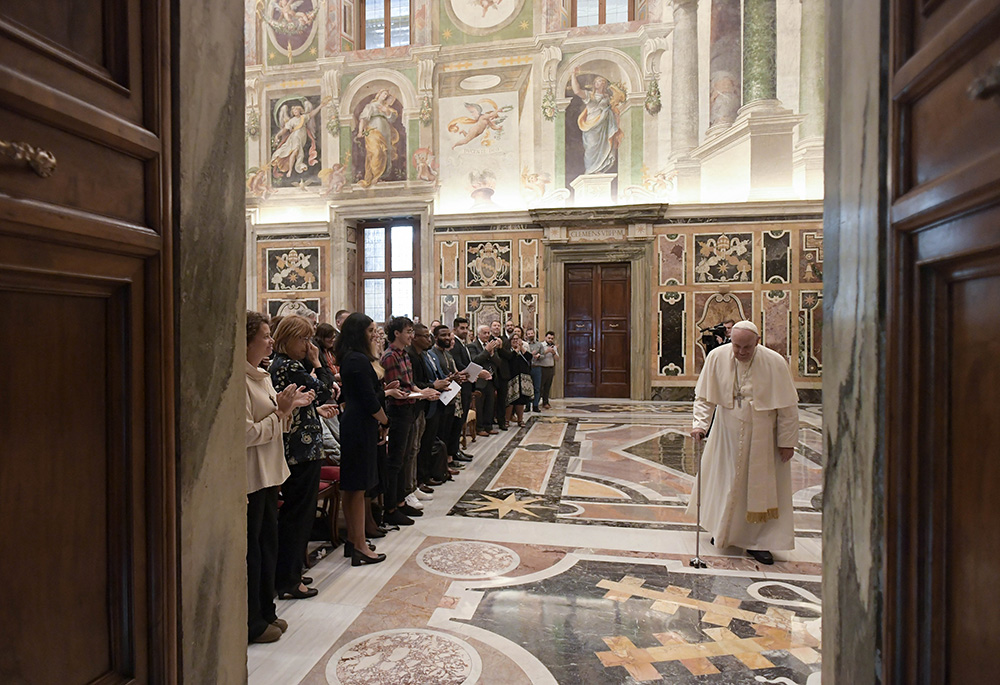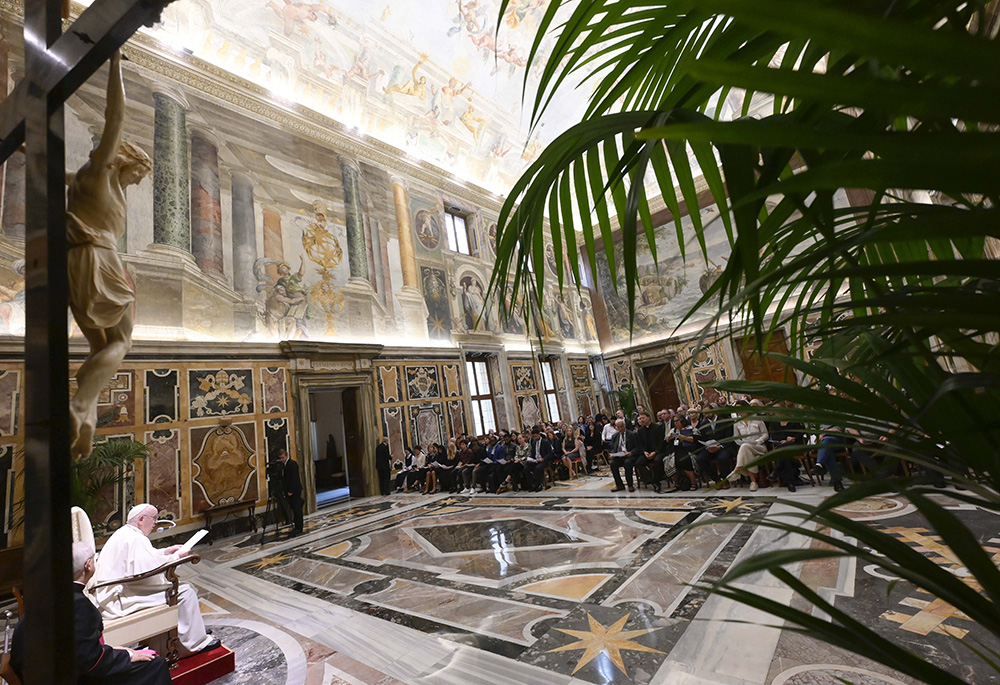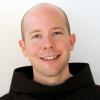
Pope Francis uses a cane as he leaves an audience with participants attending a conference promoting educational initiatives for migrants and refugees, Sept. 29 at the Vatican. (CNS/Vatican Media)
Over the last two years an increasingly politicized and polarized debate has arisen around the purpose of education and what should or should not be included in the content of instruction. From history curricula that acknowledges the painful truth of Indigenous genocide and chattel slavery in America to policies and programs that recognize the diversity of experiences related to gender and sexuality, there appears to be an ever-growing list of "controversial issues" serving as third-rail topics in primary, secondary and even college-level education.
With this context in mind, I read Pope Francis' Sept. 29 address at a conference on "Initiatives in Refugee and Migrant Education," held at the Jesuit Pontifical Gregorian University in Rome. Although the primary focus of the conference was on supporting and educating migrants and refugees, which itself is notable given how controversial immigration policy is in the United States, the pope's remarks are also instructive for those thinking about what the purpose and goals of education are in general and in Catholic higher education in particular.
Francis lays out some key priorities for Catholic higher education, organizing his thoughts around the three areas he sees as central in the work of faculty and administrators at Catholic colleges and universities: research, teaching and social promotion.
On the topic of research, the pope notes that inquiry is needed by scholars not only for solutions for the migration and refugee crises, but also to examine the social, political and environmental causes leading to these crises. Pointing to the many forms of political and military unrest around the globe, Francis writes: "Naturally, I am referring to the conflicts that are ravaging so many regions of our world."
He adds: "At the same time, though, I would like to point to another kind of violence, namely, the abuse of our common home. The earth has been devastated by the excessive exploitation of its resources and by decades of pollution. As a result, more and more people are forced to leave their lands, which have become uninhabitable."
Catholic institutions of higher education ought to be hubs for analyzing the "signs of the times" and interpreting them in the "light of the Gospel," as Gaudium et Spes says, especially when it comes to the dual crises of migration and climate change. In this way, Francis is implicitly referring to the need for a new way of thinking, what he often calls an "integral ecology" that, as Laudato Si’ puts it, attends to both the "cry of the earth" and the "cry of the poor."
Given the contentious debates around the purpose and goals of higher education today, this message from Francis also points to the responsibility that Catholic colleges and universities have to draw from and engage with the best of scientific discovery and knowledge. He uses the global climate crisis as an illustration: "Academia — and Catholic academia in particular — is called to play a primary role in providing answers to ecological problems and challenges. Based on scientific data, you are in a position to help in guiding and informing the decisions of government leaders in support of an effective care for our common home."
But the same logic can and should be applied to other areas of academic research and application beyond climate change. For example, Catholic institutions of higher education ought to be centers of inquiry, dialogue and instruction on cutting-edge issues, such as the deepening knowledge we have about gender and sexuality. Rather than retreat to centuries-old claims rooted in antiquated worldviews and pseudo-scientific conclusions, Catholic universities should be leaders in engaging contemporary scientific knowledge with our faith tradition to respond constructively and charitably to contemporary questions and issues.
Regarding teaching, the pope emphasizes that priority in education must be given to "the most disadvantaged." Framed again in the context of migrants and refugees, Francis suggests offering courses, modes of learning and scholarships to help migrants and refugees obtain degrees and professional qualifications.
Advertisement
Relatedly, Francis notes that, "Schools and universities are privileged environments not only for instruction but also for encounter and integration." This is certainly true when it comes to welcoming students from diverse social locations and geographic regions in a general sense, but it is also something worth recounting when it comes to differences in perspective and interpretation. The pope is calling for Catholic colleges and universities to be a place where the stories of migrants and refugees can be heard and honored, which highlights the church’s preferential option for the poor and marginalized.
This admonition can also extend to include the voices and experiences of those who have been historically disenfranchised, especially within the church and the academy. Coincidentally, many of those communities most harmed by the contentious debates around the purpose and goals of education today are those in minoritized and vulnerable groups: people of color, women, LGBTQ people, those of other religious traditions or none at all, in addition to the migrants, refugees and victims of trafficking the pope highlights.
Because of their mission, Catholic institutions of higher education should be places where such voices and experiences are not only "tolerated" but welcomed, prioritized and centered in the classroom and beyond. This might also extend to views, experiences and perspectives that have been traditionally viewed as "off-limits" in many Catholic contexts.
In particular, I am thinking of the manifold ways dialogue is still needed in the wake of the Supreme Court decision to overturn Roe v. Wade. Regardless of one's views about the legal ruling, and with the church's position already clearly articulated, there are still many questions and concerns about what this decision means for our society, and our colleges and universities can be leaders in creating a constructive space for such discussions. Francis tells us that we should pursue the work of higher education "within a perspective of justice, global responsibility and communion in diversity."
Finally, Francis points to the role that Catholic colleges and universities play beyond the confines of their institutional boundaries. Using the term "social promotion," the pope highlights the responsibility these institutions have to interact "with the social context in which they happen to operate."

Pope Francis leads an audience with participants attending a conference promoting educational initiatives for migrants and refugees, Sept. 29 at the Vatican. (CNS/Vatican Media)
He adds: "They can help to identify and indicate the foundations for the construction of an intercultural society, in which ethnic, linguistic and religious diversity is seen as a source of enrichment and not an obstacle for the common future."
Again, while the presenting context is the crisis of migrants and refugees today, this focus on social engagement is important because colleges and universities have long been the place to provide resources, insights and venues for constructive dialogue and education for the broader community to serve the common good.
On subjects like migration or climate change, racial justice or reproductive rights, Catholic educational institutions should not shy away and avoid disagreement, but take a bold, balanced, and thoughtful position rooted not only in the important value of academic freedom and constructive dialogue, but also in their mission precisely as Catholic institutions, which seek to pursue knowledge, truth and justice. The intellectual and practical resources of the university shouldn't be reserved for academics alone, but shared with the broader community.
Francis closed his remarks with the following reminder of what should guide our thinking and implementation of such efforts: "Every educational institution is called to be a place of welcome, protection or accompaniment, promotion and integration for all, to the exclusion of none." Now it is the responsibility of those of us in Catholic higher education to put that into practice.








